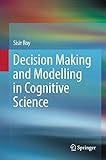Decision making and modelling in cognitive science /Sisir Roy.
Material type: TextPublication details: New Delhi : Springer, (c)2016.Description: 1 online resourceContent type:
TextPublication details: New Delhi : Springer, (c)2016.Description: 1 online resourceContent type: - text
- computer
- online resource
- 9788132236221
- 813223622X
- HD30 .D435 2016
- COPYRIGHT NOT covered - Click this link to request copyright permission: https://lib.ciu.edu/copyright-request-form
| Item type | Current library | Collection | Call number | URL | Status | Date due | Barcode | |
|---|---|---|---|---|---|---|---|---|
 Online Book (LOGIN USING YOUR MY CIU LOGIN AND PASSWORD)
Online Book (LOGIN USING YOUR MY CIU LOGIN AND PASSWORD)
|
G. Allen Fleece Library ONLINE | Non-fiction | HD30.23 (Browse shelf(Opens below)) | Link to resource | Available | ocn961930078 |
Includes bibliographical references.
Foreword; Preface; Contents; About the Author; 1 Introduction; Abstract; 1.1 Various Aspects of Decision Making; 1.2 Emotion, Logic and Decision Making; References; 2 Various Approaches to Decision Making; Abstract; 2.1 Decision Making (On the Basis of Human Decisions); 2.1.1 Canonical Approach and Normative Models; 2.1.2 The Axiomatic Approach; 2.1.3 Bayesian Probabilistic Approach; 2.1.4 Bayesian Statistics; 2.1.5 Bayes' Rule; 2.2 Decision Making and Statistical Inference; 2.2.1 Bayesian Probability and Cognitive Domain; 2.3 Dempster-Shafer Theory.
2.3.1 Cognition and Emotion in Human Decision MakingReferences; 3 Predictability of Brain and Decision Making; Abstract; 3.1 Prediction and Movement; 3.2 How Does the Brain Predict?; 3.2.1 Motor Binding in Time and the Centralization on Prediction; 3.2.1.1 Pulsatile Motor Control System; 3.3 How Can a Neuronal Circuit Predict?; 3.4 Dynamic Geometry and Bayesian Approach to Decision Theory; References; 4 New Empirical Evidences on Decision Making and Cognition; Abstract; 4.1 Disjunction Effect; 4.2 Categorization-Decision Interaction; 4.3 Perception of Ambiguous Figures.
4.4 Conjunction and Disjunction Fallacies4.5 Over Extension of Category Membership; 4.6 Over-Distribution Effect in Memory Recognition; 4.7 Failures of Commutativity in Decision Making; 4.7.1 Non-commutativity and the Uncertainty Principle Underlying the Functional Architecture of the V1 Cortical Area; 4.7.2 Architecture of VI Area; 4.8 Uncertainty Relation and Ambiguity in Perception; 4.9 Uncertainty Relations for Unsharp Observables; 4.10 Wave-Particle Dualism and Double Slit Experiment; References; 5 Fundamental Concepts of Mathematics and Quantum Formalism; Abstract; 5.1 Postulates.
5.2 Mathematical Preliminaries5.2.1 Vector Space; 5.2.2 Subspaces; 5.2.3 Norms; 5.2.4 Scalar Product; 5.3 Hilbert Space; 5.3.1 Hermitian Operator; 5.3.2 Unitary Operator; 5.4 Commutative Properties; 5.4.1 Projection Operator; 5.5 Projection Postulate (PP); 5.5.1 Statement of Projection Postulate (PP); 5.6 Unsharp Observable and Operational Quantum Theory; 5.7 Stern-Gerlach Experiment; 5.8 POVM for Spin-Half Particles; References; 6 The Complementary Principle, Concept of Filter and Cognition Process; Abstract; 6.1 Spatiotemporal Representation of Image.
6.2 The Response-Percept Domain and Observation Process6.3 The Complementarity Principle, Percepts and Concept; References; 7 Quantum Probability Theory and Non-Boolean Logic; Abstract; 7.1 Logic and Cognition; 7.2 Logic and Decision Making; 7.3 Boolean Algebra; 7.4 Quantum Logic and Non-Boolean Algebra; 7.4.1 Propositional Logic; 7.4.2 Lattices; References; 8 Quantum Ontology and Context Dependence; Abstract; 8.1 Newton and Metaphysics; 8.2 Quantum Ontology; References; 9 Modern Neuroscience and Quantum Logic; Abstract; References.
This book discusses the paradigm of quantum ontology as an appropriate model for measuring cognitive processes. It clearly shows the inadequacy of the application of classical probability theory in modelling the human cognitive domain. The chapters investigate the context dependence and neuronal basis of cognition in a coherent manner. According to this framework, epistemological issues related to decision making and state of mind are seen to be similar to issues related to equanimity and neutral mind, as discussed in Buddhist perspective. The author states that quantum ontology as a modelling tool will help scientists create new methodologies of modelling in other streams of science as well.
COPYRIGHT NOT covered - Click this link to request copyright permission:
There are no comments on this title.
